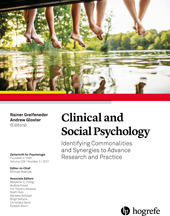Call for Papers: Psychological Perspectives on the COVID-19 Pandemic: Challenges and Chances
A Topical Issue of the Zeitschrift für Psychologie
Focus of the Topical Issue, Aims, and Scope
Despite being an infectious disease, many resulting consequences of the COVID-19 pandemic, associated containment measures, and long-term effects on societies are psychological in nature. Indeed, the pandemic sheds light on many societal problems – from deficient health care systems and structural discrimination to insufficient digitalization. In a similar vein, the pandemic and associated major shifts in our societies also unravel novel possibilities that may bear potential for innovative solutions to some of the major challenges of our time. In this thematic issue, we will highlight the challenges and chances that become visible during the pandemic from a psychological perspective. Furthermore, the added value of the psychological perspective to alleviate the short- and long-term consequences of the pandemic on individuals and societies will be highlighted. We invite manuscripts from all psychological disciplines on the topic of the COVID-19 pandemic and associated psychological aspects which may include negative as well as positive perspectives. Both original papers as well as systematic reviews and meta-analyses are welcome in this special issue. The topics covered may include (but are not limited to):
- –The impact of the pandemic on mental health of children, adolescents, and adults.
- –Effects on developmental trajectories and (digital) education.
- –Bio-psychological consequences of COVID-19 and its burden on (mental) health.
- –Psychological effects of economic consequences and work conditions on well-being and mental health.
- –Relevance of social ties, cohesion, and resilience for individuals and societies as protective factors buffering the pandemic.
- –Digitalization and E-mental health in times of a pandemic (and beyond).
- –Psychological models about protests against regulations and associated conspiracy myths.
- –Stigma and prejudices associated with COVID-19 infections.
- –“Lessons learned” for other global crises (e.g., climate change) and social systems coping with major challenges.
How to Submit
There is a two-stage submission process. Initially, interested authors are requested to submit extended abstracts of their proposed papers. Authors of the selected abstracts will then be invited to submit full papers. All manuscripts will undergo blind peer review.
Stage 1: Structured Abstract Submission
Authors interested in this special issue must submit a structured abstract of the planned manuscript before submitting a full paper. The goal is to provide authors with prompt feedback regarding the suitability and relevance of the planned manuscript to the special issue.
The deadline for submitting structured abstracts is April 15, 2022.
Feedback on whether or not the editors encourage authors to submit a full paper will be given by May 15, 2022.
Structured abstracts should be within four pages and may encompass information on each of the following headings: (a) Background and Objectives, (b) Methods, (c) Results, (d) Conclusions.
Structured abstracts should be submitted by email to the guest editor Hanna Christiansen (christih@staff.
Stage 2: Full Paper Submission
For those who have been encouraged to submit a full paper,
the deadline for submission of manuscripts is August 15, 2022.
Full manuscripts will undergo a blind peer-review process.
Submission Guidelines for Full Papers
- –Only English-language submissions can be considered.
- –Contributions must be original (not published previously or currently under review for publication elsewhere).
- –Review and original articles should not exceed 45,000 characters and spaces in length, including references, figures, and tables (allowances for figures and tables should be deducted on the basis of size: approximately 1,250 characters for a quarter-page figure/table).
- –All research syntheses should adhere to the meta-analytic reporting standards (MARS) proposed by the APA (http://www.apa.org/pubs/authors/jars.pdf). Additionally, authors should include a statement in accordance with the Preferred Reporting Items for Systematic Reviews and Meta-Analyses (PRISMA) statement (http://www.prisma-statement.org) as a supplemental file for review.
- –Other submission formats (short reports, research summaries, opinion pieces, etc.) are also considered, please contact the editors for details.
- –Reference citations in the text and in the reference list should be in accordance with the principles set out in the Publication Manual of the American Psychological Association (7th ed.).
- –Supplementary material must be made available through PsychArchives: https://www.psycharchives.org/
- –See also any recent issue of the journal for exemplary articles.
For detailed author guidelines, please see the journal’s website at http://www.hgf.io/zfp
Timeline
- –April 15, 2022: abstract submissions due
- –May 15, 2022: deadline for abstract selection/call for full papers
- –August 15, 2022: full paper submissions due
- –October 15, 2022: guest editor feedback to authors
- –November 15, 2022: deadline for revised papers
- –November 30, 2022: guest editor feedback to revised papers
- –Issue 2 (2023): publication topical issue
About the Journal
The Zeitschrift für Psychologie, founded in 1890, is the oldest psychology journal in Europe and the second oldest in the world. One of the founding editors was Hermann Ebbinghaus. Since 2007 it is published in English and devoted to publishing topical issues that provide state-of-the-art reviews of current research in psychology.



